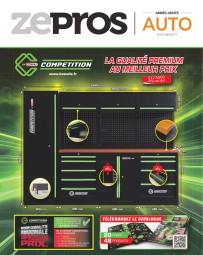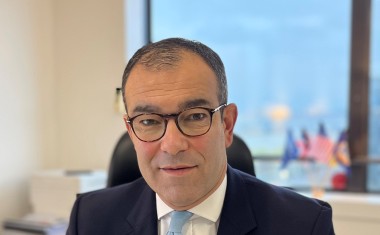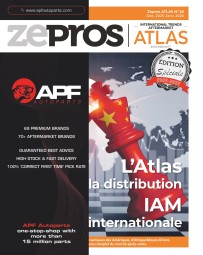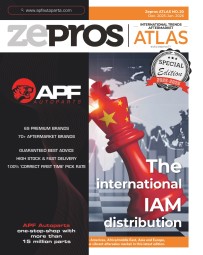
AAG: "No one will be spared. Those who anticipate best will survive."

In the midst of the turbulence experienced by the automotive industry in general, the independent distribution sector will stay the course! This is the clear message from Franck Baduel, CEO of Alliance Automotive Groupe, who is not deviating from his European roadmap. His weapon? Anticipation, as always...
Can you give us an overview of your acquisitions in 2024?
Franck Baduel: In 2024, we achieved nearly €100 million in acquisitions across 18 companies, primarily in the UK, Ireland, Belgium, and the Netherlands, where opportunities were most abundant. Breaking it down, 50% of the acquired companies focus on the sales of mechanical parts, while the rest specialise in paint and related businesses, as well as tyres. In the Netherlands, we expanded significantly by acquiring parts distributors Roskamp, SDS Autoparts, Ronden Banden, and Habu Automaterials. Additionally, we strengthened our presence in the accident repair sector. Our portfolio now includes body parts and paint distributors such as Wico Autolak & Wico Coatings and AJ Coatings. We have also enhanced our position in body repair services by integrating ASN, a network of approximately 100 franchised body shops. We project overall growth of 6–7%, driven primarily by external acquisitions, in a market environment with near-zero inflation. This translates to a turnover of €3.6 billion across Europe (spanning nine countries) through our 780 subsidiaries.
What is the typical profile of your independent European distributors?
FB: Out of 2,500 sales points, a total of 1,700 are owned by nearly 1,000 investor members in our group. They are mainly present in cars and light commercial vehicles. Two thirds of these do not exceed €5 million in turnover, and 20% over €10 million. These acquisitions may appear quite eclectic, but they accurately reflect the diverse and multifaceted nature of the aftermarket industry.
Are these distributors already preparing to add Chinese electrical parts to their stocks?
FB: We are constantly keeping an eye on all fronts, and this is one of them. We have less than four years to react as these vehicles are arriving on our roads in Western Europe. Especially since after-sales service is not the priority of Chinese manufacturers. Our distributors and repairers are getting ready. We are pooling all our European resources. We will adapt, as always. The next step is to make some strategic selections in a market where nearly 150 brands are fiercely competing. Some natural selection is already taking place there. Some will disappear!
Is the Paris Automotive Business Forum (FAB), that takes place over one day and brings together your French distributors and repairers, being rollout elsewhere?
FB: The FAB is an AAG event that requires a lot of commitment from our national distributors – subsidiaries and independents – to attract their repairers, operating under our name, to Paris for a day and generate some good business. We don't necessarily operate in the same way with our repair networks elsewhere. To a lesser extent, we organise events in Belgium, the Netherlands and UK, and even in Germany with an annual format similar to the FAB. On the other hand, this doesn't exist in Spain and Portugal for example.
Four years ago, we set new strategic directions, placing the development of country-specific logistics tools at the core of our decisions.
The French logistics platform First, planned for January 2024, only recently started up. What were the reasons for this delay?
FB: This 50,000 m2 mega-platform already supplies the sales points of our subsidiaries, Precisium and Gefa. We have indeed experienced a few months delay, which is unfortunate. But these things happen, especially for a project that is as ambitious and complex in terms of IT, processes and logistics. First will accelerate in the coming months to reach its peak performance. To get a better understanding, we need to take a step back. Four years ago, we set new strategic directions, placing the development of country-specific logistics tools at the core of our decisions. Since then, several new automated hubs have become operational. These include the hub in Germany dedicated to original parts—excluding BMW—spanning 26,000 m² (280,000 sq. ft.), the 23,000 m² (247,000 sq. ft.) hub in Spain for our local subsidiary, and another hub in the Netherlands. And as planned, in 2025 we will open a 90,000 m2 semi-automated mega-platform in the north of England, which will serve the UK and Ireland.
What progress have you made with rental companies and fleets?
FB: Coordination between the European manager and the country managers means that we can address all these customers and even refine our offers according to our agreements with them, in the supply of parts, services with the workshop networks, breakdowns and so on. They all seek comprehensive geographical coverage and global services. Some major accounts operate locally and are present in at least two countries, while others have an even broader presence across Europe. Those covering Europe want a single point of contact for the management of their fleets. Moreover, in the “Major Accounts” segment, competition is fierce among a select group of European players capable of responding effectively to calls for tender—and we are proud to be one of them.
What does Groupauto International bring to AAG?
FB: The international perspective has paved the way for our development over the past thirty years. Even in 2017, when GPC entered the scene, there was never any question of stepping away—a testament to its deep interest in our operations, far beyond the simple advantage of attractive purchasing conditions. This International Trading Group is present in around a hundred countries and brings together a panel of companies that are very diverse in size, culture and strategy. We connect to suppliers that were previously inaccessible. We take inspiration from their tools, particularly digital ones, to further develop and implement them within our own networks. We recently concluded our latest congress in the United States, which included a full day dedicated to understanding the dynamics of the American market in general and the aftermarket in particular. Its network of distribution and repair networks is unique in the world. All these points differentiate us from other ITGs, by the way.
The fundamentals are there: growth and aging of the parc and stable mileage.
What are your thoughts on the current dynamism or potential slowdown in certain markets?
FB: Growth in Germany has seriously slowed, due to its political instability. The country has not yet succeeded in the electric transition. German manufacturers are not getting the expected return on the colossal investments injected over the past eight years into electric vehicles. Redundancy programmes are in place in almost all German suppliers. In after-sales, maintenance plans are being extended, customers are content with the bare minimum in terms of repairs. All these phenomena can be seen elsewhere, but Germany is indeed the nerve centre of the automobile industry in Europe, in original equipment as well as aftermarket. This German situation is not necessarily the case elsewhere. Even if it is certain that an unstable climate generates caution, let's not fall into anxiety-provoking projections. Because in the aftermarket, the fundamentals are there: growth and aging of the parc and stable mileage. There are more positive signs for repairs, even if they may seem contradictory to what manufacturers and equipment suppliers are going through.
Could this tsunami hitting OE also affect aftermarket players in the medium term?
FB: That question is complex, as is the period that suppliers are currently going through. The Chinese slowdown, geopolitical circumstances and the environmental transition largely explain the current situation for manufacturers and suppliers. The fall in new vehicle sales will inevitably affect IAM four years later, with fewer vehicles to repair. No one will be spared. Those who have anticipated best will survive. Paradoxically, even with the growing penetration of electric vehicles in the IAM market, the current slowdown will only gradually impact the aftermarket's value.








